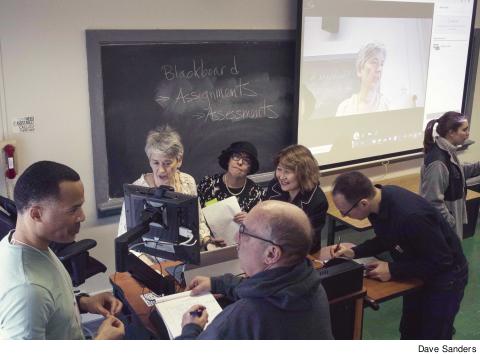PSC blasts admin’s ‘recalibration’ plan
 |
As the COVID-19 crisis began to hit New York City in March, PSC members agitated for CUNY to move to remote learning immediately, following the lead of several tristate universities. CUNY management replied that the university would follow state government directives, but after pressure from the PSC leaders and rank-and-file members, all instruction was shifted to “distance learning.” As this crisis has been a test of the government and the American health-care system, so too has it been a test of the academy. At CUNY, where many students, faculty and staff are under-resourced for such a shift, the transition has been time-consuming and sometimes impossible.
CUNY professors and lecturers, like their colleagues around the country, are hunkering down at home and adjusting to non-classroom teaching. Given the speed of the health-care emergency’s progress, there was little time for instructors to adapt. At Brooklyn College, instructional staff received distance-learning training on March 12, right before the CUNY system closed its classrooms.
SHOCKING MEMO
But just five days after faculty members across CUNY had begun to teach through online technology, the CUNY chancellor dropped a bombshell. In a letter to the CUNY community, Chancellor Félix Matos Rodríguez said that the university would take a break to “recalibrate” the distance program in order to distribute equipment to students who may not have what they need for online classes.
Recalibration took effect at certain CUNY schools on March 27 and distance learning resumed April 2. CUNY also shortened spring break, scheduling it from April 8 to April 10. Faculty across the system were furious. Hundreds of members wrote to the union voicing their frustration.
“Faculty are upset because we are paying with our spring break, and with additional work revising syllabi, for a problem the CUNY administration could have anticipated. Ensuring student access to loaner laptops should have been part of the initial move online,” said James Davis, PSC chapter chair at Brooklyn College. “Rather than giving just five days to overhaul our courses and learn new remote-learning platforms, the university could have pumped the brakes, given everyone involved – students, faculty and staff – a moment to say what they need to maintain academic continuity. Instead, rushed into teaching online, we rose to the challenge and did tons of work, only to be told after a week to wait, and at the expense of most of spring break. No one’s flying off to Miami Beach, but everyone deserves a break during this stressful public health crisis. And our hourly instructors deserve to be paid for the many additional hours they’re working.”
Rosa Squillacote, a delegate from the PSC Graduate Center chapter who teaches at Hunter College, said, “I am very angered by the recalibration decision. While it is true that we aren’t going anywhere for spring break, the point of the break isn’t for travel but to have a break. I think both we and our students need some time off to get a grip – emotionally, physically – on what is going on. Additionally, the shortened break is being exchanged for recalibration time, which means we are being required to do even more additional uncompensated labor. I am not used to teaching online, and it took a lot of work for me to translate my classes – and now I need to change the schedule again? No. I am ignoring this order and continuing with my classes as I had originally scheduled them. I am not spending more time reorganizing my syllabus, when this semester is already taking up far too much unpaid time.”
And Bronx Community College PSC Chapter Chair Sharon Utakis said, “CUNY didn’t have a plan to deal with this situation, so they’re making it up as they go along, and not consulting the people who are actually doing the work.”
Echoing many of the complaints from the faculty, PSC President Barbara Bowen said, in a message to members, “The PSC is also concerned that each college president is being asked to make a plan for how laptops and other equipment will be distributed to students. Librarians and professional staff must not be asked to put themselves and the public safety at risk to do the distribution.”
PSC RESPONSE
Bowen said that after union pressure, the university altered its original position about rearranging spring break and that the recalibration period would be days off for faculty. She said, “The union acknowledges, however, that because CUNY management has now made a second shift in the teaching schedule, faculty who developed a schedule of assignments based on the original academic calendar may have to spend much of the recalibration week reorganizing their courses yet again. The union continues to be in discussion with CUNY about the effects of the changed schedule.”
In general, faculty members had mixed reviews about teaching from home. In addition to the amount of time needed to restructure courses for distance technology presentation and student engagement, it is a challenge to create deadlines for student work and revise expectations. Some adjuncts, for example, did not have appropriate software or internet connections to make the sudden move to remote teaching. Others raised questions about how the sudden shift would affect tenure reviews, observations and issues of privacy.
“I am generally suspicious of online teaching both for pedagogical (the importance of social interaction to learning) and union-professional reasons (it can be a step toward management assuming ownership of our work),” Charles Post, a professor of sociology at the Borough of Manhattan Community College, wrote in an email. “However, facing a choice between no instruction and online, I do choose the latter. Unfortunately, neither Blackboard nor CUNYfirst has up-to-date email addresses for our students, many students have no or inadequate access to the digital platforms and most are simply overwhelmed with the social fallout of the pandemic.”
GETTING ADJUSTED
“At City College’s School of Education, the associate dean took over the online instruction tutorial workshop responsibility. He offered one on-site and two online workshops for faculty,” said Carol Huang, the PSC chapter chair at City College. “I decided to get ahead of schedule and did my online instruction on Monday and Tuesday [March 16 and 17] just to get my students ready. [Class with my] graduate students on Monday went well…. But for my undergraduate students on Tuesday, it was not easy. Many did not appear, and for those who appeared, they have many problems. The speed of internet was obviously slower than Monday. My students could not hear me clearly.”
HELPING EACH OTHER
Sarah Chinn, the chair of the English department at Hunter College, said, “I guess it is positive that I’m learning to use online tools. Beyond that, it’s hard to see much upside. Actually, one positive thing I’m seeing is that people are really going above and beyond to help each other and the students. Our IT folks have been available by video chat every day and helping people with the most complicated and most basic problems. As chair, I’ve had to deal not just with my own class, but also making sure that all the English faculty – about 35 full-timers and 140 adjuncts – are getting everything they need.” Rebecca Smart, an adjunct instructor in the psychology departments at Baruch College and BMCC, said, “From my experience at Baruch and BMCC, the response has been as good as could be expected. My department chairs especially have been great for providing updates and resources.”

